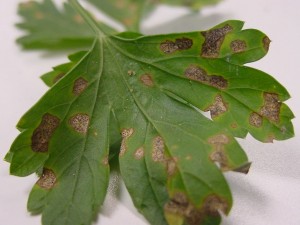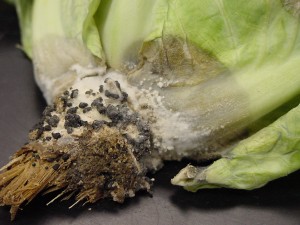Septoria leaf spot (SLS) in Parsley can cause significant losses in fields where it has become established. Like other Septoria’s, the leaf spots produced on parsley look much like the leaf spots produced on tomatoes and other crops. Septoria leaf spot overwinters from year to year on infected debris so long crop rotations of 2 or more years are important to help reduce disease pressure. During the season, SLS will spread rapidly with each subsequent rainfall and/or overhead irrigation event. Therefore, early detection and preventative fungicide applications are key to successfully controlling SLS. There have been a few new fungicides labeled for SLS control in the past few years.

Septoria leaf spot of Parsley

